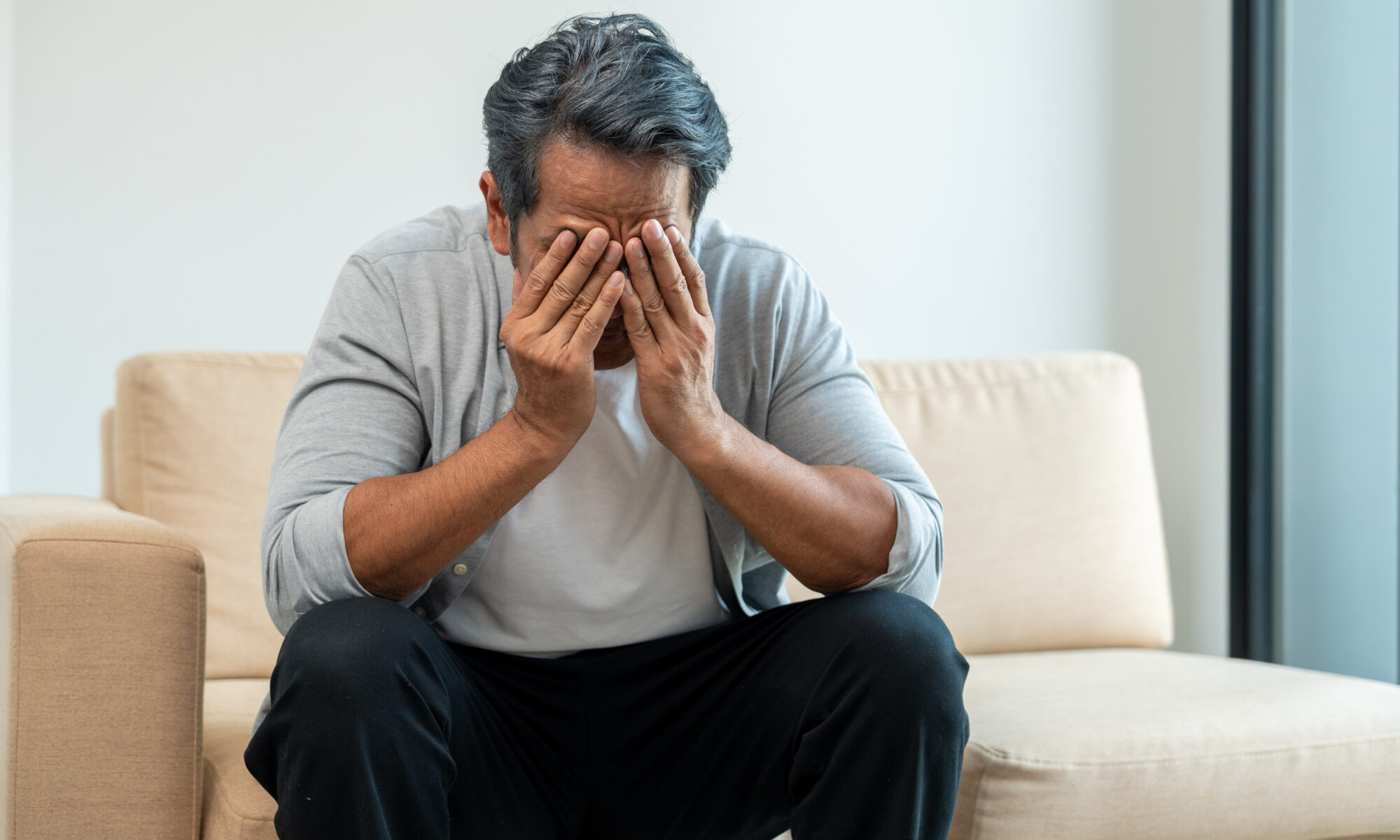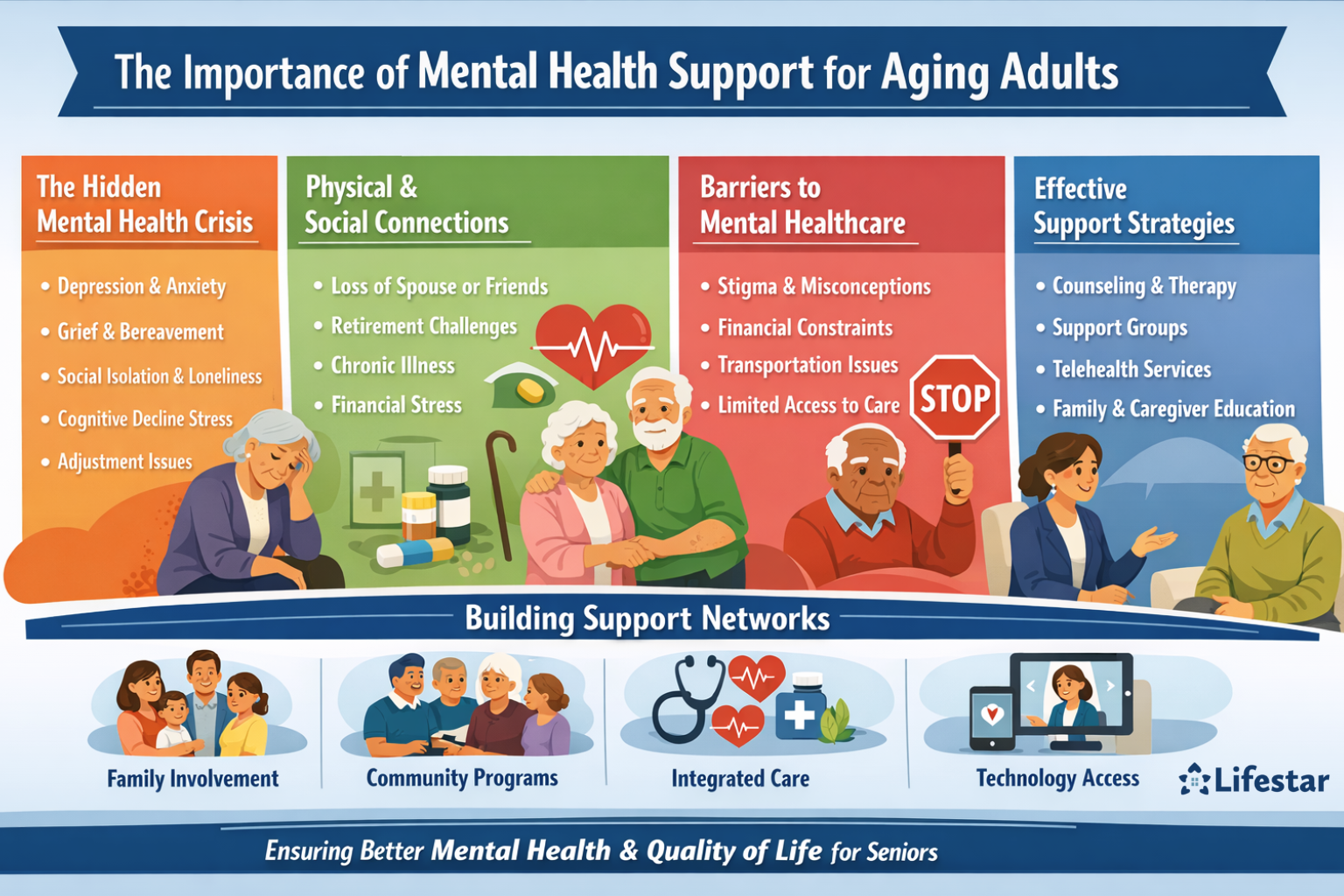
Table of Content
Mental health challenges don’t disappear with age—they often become more complex. As our population continues to age, understanding and addressing the unique mental health needs of seniors has become a critical healthcare priority that affects millions of families nationwide.
The Hidden Mental Health Crisis among Older Adults
Mental health issues in seniors often go unrecognized and untreated. Depression affects approximately 7 percent of adults over 65, yet many cases remain undiagnosed due to stigma and misconceptions about aging. Common mental health concerns include:
- Depression and anxiety disorders
- Grief and bereavement issues
- Social isolation and loneliness
- Cognitive decline–related stress
- Adjustment disorders from life transitions
Unlike younger adults, seniors may experience mental health symptoms differently, making diagnosis more challenging. Physical symptoms like fatigue, sleep disturbances, and appetite changes can mask underlying depression or anxiety.
Seniors who experience cognitive decline due to dementia may be more susceptible to depression and other mental health issues. Aging in place can present a few challenges for seniors living with dementia. However, they can still live independently at home with the help of professional dementia care Oklahoma City families can rely on. Lifestar Home Care can provide their elderly loved ones with mental and social stimulation, timely medication reminders, assistance with meal prep, and much more. Our caregivers are available around the clock to help your loved one live a happier and healthier life.

Breaking Down Barriers to Mental Healthcare
Several obstacles prevent seniors from accessing mental health support. Financial constraints, limited mobility, and transportation issues create practical barriers. Medicare coverage for mental health services, while improved, still presents gaps that many seniors face difficulty navigating.
Stigma remains a significant challenge. Many older adults grew up during times when mental health treatment carried heavy social stigma. They may view seeking help as a sign of weakness or worry about burdening their families. Encouraging strategies to prevent Lou Gehrig’s disease in aging adults can promote both physical and cognitive health, complementing mental health care. Healthcare providers sometimes overlook mental health symptoms, attributing them to normal aging rather than treatable conditions.
The Physical and Social Connection
Mental and physical health are deeply interconnected in older adults. Chronic conditions like diabetes, heart disease, and arthritis increase the risk of depression. Conversely, untreated mental health issues can worsen physical symptoms and reduce treatment compliance.
Social factors play an equally important role:
- Loss of spouses, friends, and family members
- Retirement and loss of purpose
- Reduced independence and mobility
- Financial stress from fixed incomes
- Changes in living situations
These life changes can trigger or exacerbate mental health challenges, making comprehensive support systems essential.
When their aging loved ones need companionship and socialization a few hours a week or just need minor assistance with daily household tasks, respite care Oklahoma City families trust can be a wonderful solution. At Lifestar Home Care, we thrive on helping seniors maintain their independence while living in the comfort of home.
Effective Support Strategies and Interventions
Mental health support for seniors requires a multifaceted approach. Professional counseling and therapy remain foundational, with cognitive behavioral therapy showing particular effectiveness for older adults. Group therapy sessions provide both treatment and social connection opportunities.
Community-based programs offer valuable support:
- Senior centers with mental health programming
- Peer support groups and counseling
- Telehealth services for remote access
- Integrated care models combining physical and mental health
- Family education and caregiver support programs
Technology is expanding access through teletherapy and mental health apps designed for seniors. These tools overcome transportation barriers while providing convenient access to professional support.
Building Support Networks that Work
Family members and caregivers play crucial roles in mental health support. Recognizing warning signs, encouraging professional help, and providing emotional support significantly impact outcomes. However, family members also need resources and education to provide effective support without becoming overwhelmed themselves.
Professional healthcare teams should include mental health specialists familiar with geriatric care. Primary care physicians, nurses, social workers, and mental health counselors working together create comprehensive support networks that address the whole person rather than isolated symptoms. Families can also stay informed about the benefits and risks of wine for seniors so they can support healthier lifestyle choices alongside professional care.
Community organizations, religious institutions, and volunteer programs provide additional layers of support. These networks combat isolation while offering practical assistance and social engagement opportunities that promote mental wellness.
The importance of mental health support for seniors extends beyond individual wellbeing to family stability and community health. As we continue to address the growing needs of an aging population, prioritizing mental health support becomes not just compassionate care but also essential healthcare infrastructure for our communities.
If you have a senior loved one who needs help maintaining a high quality of life while aging in place, reach out to Lifestar Home Care, a leading provider of home care service Oklahoma City families can trust. Our caregivers help seniors focus on healthy lifestyle habits such as eating nutritious foods, exercising regularly, and maintaining strong social ties, and we offer mentally stimulating activities that can boost cognitive health and delay the onset of dementia. Call us today to learn about our comprehensive in-home care plans.